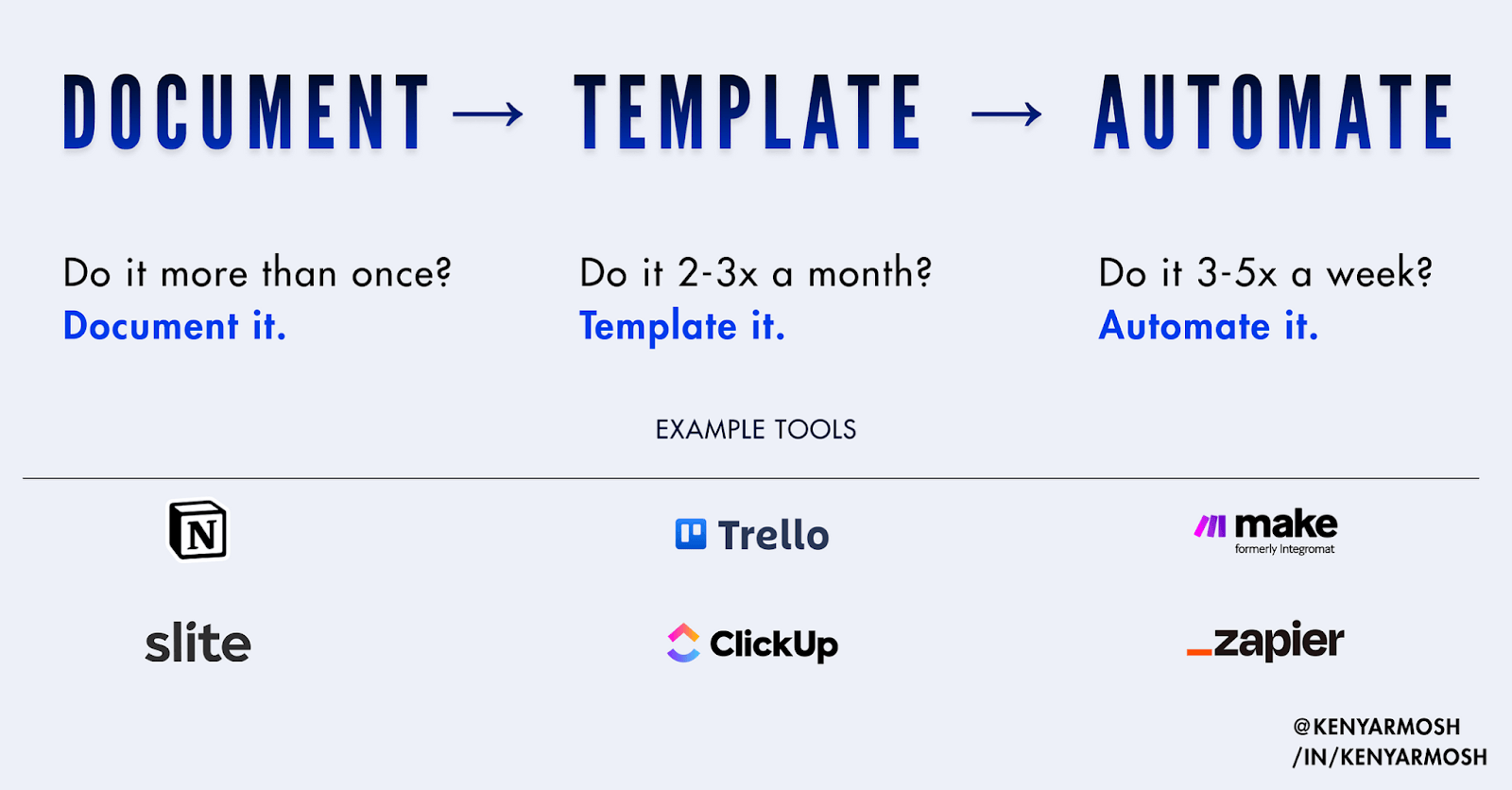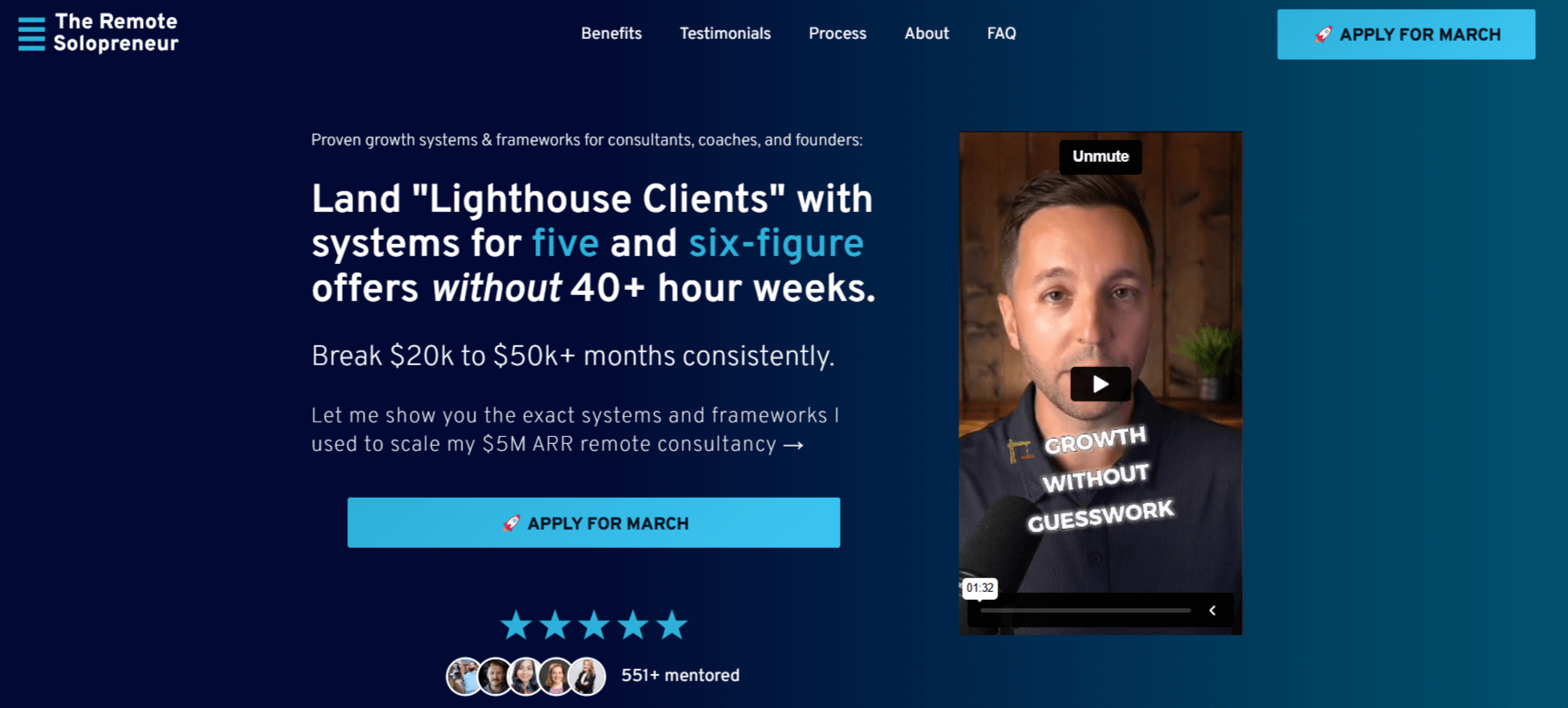🚀 TL;DR
- Thriving as a solopreneur means excelling in three domains: hard skills, soft skills, and mentality.
- Hard skills include marketing and sales, building repeatable systems, financial management, client delivery, and choosing the right technology.
- Soft skills like clear communication, networking, adaptability, and self-awareness create leverage and long-term trust.
- Mental strength comes from focus, consistency, confidence backed by results, and a deeper sense of purpose to sustain momentum.
- Progress compounds across these areas—improving one reinforces the others, and mastery comes from steady, intentional practice.
Being a solopreneur isn't about doing everything but mastering the right things.
Most consultants, founders, and freelancers hit a ceiling because they're approaching solopreneurship all wrong. They're trying to become experts at everything from marketing to client delivery all at once.
That path leads straight to overwhelm and burnout.
I've been a remote solopreneur since 2005, scaling multiple businesses to seven figures without big teams or venture funding. What I've discovered is that successful solopreneurs focus on mastering 3 interconnected skill domains that compound over time:
- Hard skills
- Soft skills
- Mentality
In this guide, I'll break down the specific capabilities within each domain that move the needle for your business.
Domain #1: Hard skills
The technical capabilities you develop directly impact what you can offer and how effectively you can deliver it. Here’s what you need to focus on:
1. Marketing and sales
Most freelancers start with their skills and try to find clients who need them. Successful solopreneurs do the opposite—they identify specific problems their target clients face and then craft solutions that solve those problems.
The foundation of effective marketing begins with message clarity:
- Who exactly are you serving?
- What specific problem do you solve?
- How does your solution transform their situation?
When you can articulate these elements with precision, every marketing effort becomes more effective.
Develop a scalable service offer from this foundation that becomes your calling card. Your offer bridges your marketing and sales by giving potential clients something concrete to respond to rather than vague capabilities.
Instead of spreading yourself thin across multiple platforms, identify where your ideal clients already spend time. Is it LinkedIn? Industry-specific forums? Podcast audiences? Select one primary channel and master it completely before expanding elsewhere.
Consistency in one place creates momentum that random posts across many platforms never will.
This focused approach creates a natural transition to your sales process. When potential clients encounter your targeted marketing that speaks directly to their challenges, they enter conversations already partially sold on working with you.
Sales then becomes less about persuasion and more about confirmation and discovery. Instead of convincing prospects to work with you, your conversations center on determining whether your solution truly fits their needs.
This shift changes sales from something many solo business owners dread into a natural extension of helping people.
2. Operations
Most freelancers operate in reactive chaos, handling each client differently and recreating processes from scratch each time. True solopreneurs create and document repeatable systems for everything: client onboarding, project management, invoicing, and delivery.
The DTA framework—Document, Template, Automate—turns your recurring tasks into scalable processes. Start by documenting exactly how you complete a task, create templates to standardize it, and finally automate parts with tools like Zapier or TextExpander.

3. Finance
Financial literacy separates sustainable businesses from struggling ones. Understand your numbers—for example, profit margins, cash flow projections, and tax obligations.
Set up separate business accounts, track expenses meticulously, and establish a predictable billing cycle that supports healthy cash flow. I usually recommend Mercury for this purpose.
Know what metrics matter for your business. Most solopreneurs track vanity metrics (social media followers, website visits) i nstead of those that predict business health (profit per client, client retention rate, time spent per deliverable). So, make sure you know your numbers.
4. Client delivery
Your reputation lives and dies with how you deliver. Establish clear processes for kickoffs, milestone reviews, and final deliverables that ensure you never miss deadlines or expectations.
Document your methodologies and proprietary approaches. This ensures consistent quality and helps you deliver more efficiently over time. Each new client benefits from everything you've learned with previous ones.
Create systems for gathering client feedback throughout the engagement rather than just at the end. This allows you to course-correct before small issues become big problems and demonstrate your commitment to their success.
Here's what Danny Delvecchio, a video consultant has to say about our work together.
Consider having a dedicated private space, where clients can access updates, resources, and key resources. For example, I usually use Trello—but I’ve helped other solopreneurs also use tools like ClickUp or Notion. This reduces the constant back-and-forth communication and makes you look more professional.
5. Technology
Technology should serve your business, not complicate it. Resist tool proliferation—adding new software without strategically evaluating whether it truly solves a problem creates more complexity than value.
Master tools that directly support your core business functions first. A proper CRM for client management, project management for delivery, and financial accounting software form the foundation. Only add specialized tools when you've maxed out the capabilities of your core stack.
Invest time learning automation capabilities within your existing tools before adding new ones. Most solopreneurs use less than 20% of their tools' functionality, missing opportunities for efficiency without spending another dollar.
You don't need a thousand-dollar tech stack. You need the right 2–3 tools that help you stay focused and deliver consistently.
Domain #2: Soft skills
Technical expertise alone won't build a thriving business. The ability to work effectively with others—clients, collaborators, and yourself—is equally crucial.
6. Communication
Clear, confident communication is the foundation for client relationships, setting boundaries, and managing expectations. This includes everything from how you structure emails to how you handle difficult conversations.
Learn to write precisely and persuasively. Written communication forms the backbone of remote client relationships—proposals, emails, scope of work (SOW), and documentation all rely on your ability to convey ideas clearly.
Master the art of asking thoughtful questions. The right question at the right time can uncover hidden client needs, prevent misalignment, and demonstrate your expertise more effectively than any assertion.
Develop frameworks for different types of client interactions: discovery calls, onboarding meetings, feedback sessions, and project wrap-ups. Having clear structures ensures you cover essential points and guide conversations productively.
7. Networking
The most successful solopreneurs aren't the smartest or most skilled—they're the ones who keep showing up, even when nothing seems to be working.
Contrary to popular belief, networking isn't about collecting connections. It's about building meaningful relationships with peers, potential clients, and mentors who understand your journey.
Find and join communities of other solopreneurs, particularly those in adjacent fields who can become collaborators rather than competitors. These relationships provide support, referrals, and perspective when you face inevitable challenges.

Develop genuine relationships before you need them. Contribute value to others' businesses through introductions, feedback, or sharing resources without expectation of immediate return. This goodwill compounds over time.
8. Self-awareness
Understanding your unique strengths allows you to build your solopreneur business around what you do best rather than trying to force yourself into someone else's business model.
Just as important is recognizing your limitations. This isn't about self-criticism but about making strategic decisions about what to focus on versus what to delegate, automate, or simply not do.
Regularly audit how you spend your time and energy. Track your activities for a week to identify where you're most productive and what tasks consistently drain you. This data helps you make informed decisions about where to focus.
Seek feedback from trusted peers, mentors, and even clients. External perspective often reveals blind spots in your skills and business model that you can't see yourself.
9. Adaptability
The business landscape changes constantly. Tools evolve, client expectations shift, and market conditions fluctuate. Successful solopreneurs don't resist these changes—they anticipate and leverage them.
Develop the habit of regular business reviews where you evaluate what's working and what isn't. Be willing to eliminate services, marketing channels, or even clients that no longer align with your evolving business.
Stay current with industry trends and technological developments, but be selective about which ones you adopt. Not every trend requires your immediate attention or implementation.
10. Time management
Time is your scarcest resource as a solopreneur. Unlike money or clients, you can't make more of it, so managing it is crucial.
Implement time blocking or day theming to batch similar tasks together. This reduces context switching and helps maintain a deep focus on important work.

Distinguish between urgent and important tasks. Create systems that prevent urgent but low-value tasks from consuming your day while important strategic work gets postponed.
Learn to recognize and eliminate activities that create the illusion of productivity without actually moving your business forward. Busy work feels productive but yields little real progress.
Most solopreneurs get caught in a cycle of client work that leaves no time for improving their business or developing new offers. So, build in regular time for strategic thinking and business development.
Domain #3: Mentality
Mentality is still one of the hardest things to work on—yet the most important. Here's what skills you need to build in the long term:
11. Focus
Most solopreneurs dilute their effectiveness by trying to do too many things for too many types of clients.
Maintain a "not doing" list alongside your to-do list. Explicitly documenting what opportunities, clients, or activities you're declining creates space for excellence in your chosen focus areas.
Design your environment to support your focus priorities. This includes physical workspace organization, digital tool selection, notification management, and meeting schedules that protect your attention for high-value work.
Develop the habit of regular focus reviews where you evaluate whether your daily activities align with your strategic priorities. These checkpoints prevent the common drift from important to merely urgent work.
Practice saying no to opportunities that don't align with your core focus, even when they seem attractive in isolation. Each yes to a non-core activity is an implicit no to something more aligned with your primary goals.
12. Confidence
Build confidence through evidence rather than affirmations.
Document client results, track your skill development, and collect testimonials that objectively prove your impact. This creates authentic confidence based on demonstrated capability.
Prepare and practice articulating your value proposition clearly. The ability to explain what problems you solve and how you solve them differently creates confidence in both sales conversations and delivery situations.
Recognize that confidence is situational, not absolute. Even experienced solopreneurs feel uncertain in new situations or when stretching beyond their expertise. The key is viewing these moments as growth opportunities rather than failures.
13. Consistency
While many solopreneurs search for breakthrough moments and dramatic growth, sustainable success more often comes from consistency—showing up daily to execute your strategy with patience and persistence.
Create systems that make consistency easier by reducing decision fatigue. Standard operating procedures, templates, and routines preserve mental energy for important work rather than reinventing processes repeatedly.
Also, track leading indicators rather than just results. Measuring process metrics like outreach attempts, content created, or proposals sent provides feedback on your consistency before outcomes materialize.
Celebrate consistency milestones to reinforce the behavior. Recognizing streaks of daily writing, weekly client outreach, or monthly business reviews so that it creates positive reinforcement to encourage that behavior.
14. Purpose
Sustainable solopreneurship requires more than just technical skills and effective systems. It needs a motivating purpose that carries you through inevitable challenges and connects your daily work to something meaningful.
Clarify your purpose beyond financial success. While profitability is essential for business, it rarely provides enough motivation during challenging periods. What impact do you want to create? Who do you want to serve?
For example, I want to help solopreneurs build businesses that don’t chain them to their desks. Similarly, you need to think about why you’re doing this.
True solopreneurs are continuously learning and iterating
If you want to take one thing from this article, it’s this: think about areas that need improvement first and how it’ll help you build a stronger, more resilient business. Focus on those skills first.
Remember that these skills reinforce each other when developed intentionally. Strong marketing attracts the right clients, effective systems deliver consistent results, a resilient mentality carries you through challenges, and the right tools amplify everything else.
This integrated approach creates a flywheel effect where progress in one area accelerates growth in others.
Be patient with your development journey. Focus on one skill category at a time, permitting yourself to be a beginner in areas outside your expertise. Consistent progress across months and years creates capabilities that can't be rushed or shortcut.
So, the question is: what will you focus on next?

